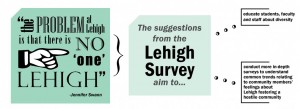
(Made by Liz Cornell and Kelly McCoy)
Last semester, Lehigh administered the first campus-wide survey since 2006 to assess the exclusive and fragmented nature on campus. In response to results shared in January, a set of suggestions was presented by the Council for Equity and Community.
Twenty-two percent of those who answered the survey believe the campus climate is a negative one, and roughly 85 percent believe this negative climate is “institutional and systematic,” according to the results.
The council’s recommendations aim to create a more inclusive and positive environment on campus, steps to which would include educating students, faculty and staff about diversity as well as conducting more in-depth surveys to understand common trends about campus sentiment about hostile community environments. These recommendations are similar to the set of recommendations that were made after the last climate survey was administered, according to Jennifer Swann, professor of biological sciences and tri-chair of the Council for Equity and Community. She said there is overlap in the recommendations because Lehigh’s past four presidents have not been as focused on creating an inclusive environment on campus as they could have been.
“The problem at Lehigh is that there is no ‘one’ Lehigh,” Swann said. “We are colleges. We are departments. We just don’t have that one thing. We need to build that.”
Pride Center director Chelsea Fullerton is excited about the changes that will ensue because of the survey. She said the Council for Equity and Community is working to ensure that the recommendations are examined and understood from “the top down.” She said President John Simon is involved with the process, and the council will be holding town hall meetings for students to express their opinions and ideas.
“Creating change is going to take time,” Fullerton said. “This is going to be a years-long process.”
Fullerton would like to see people step outside of their comfort zones and push themselves to be better individuals and members of the community. Swann said Lehigh cannot be diverse until the environment welcomes diversity, and diversity cannot be added to a hostile environment because those who are in the minority and experiencing hostility will leave the institution.
“The best way to solve this issue is to talk to the person next to you,” Swann said. “It’s very simple. Just have a regular conversation and don’t talk to them like they are a person in a zoo. Find out who they are and share things about yourself.”
Visions, an outside consulting group hired by Lehigh, has been working with staff and faculty members to discuss how to foster an inclusive environment and encourage diversity. The group’s main goal is to provide individuals with the tools needed to partake in conversations that will break down barriers. There will be another meeting in March for students to learn how to do these things. Although these sessions will be available, students cannot be mandated to improve the campus climate.
“Unfortunately, there is quite a bit of apathy on Lehigh’s campus,” Sarah Berman, ’16 and a student representative for the Council for Equity and Community, wrote in an email. “Combating that apathy takes being enthusiastic and engaged as well as going out of your way to change the status quo by talking to peers that you might not usually interact with, going to a speaker or taking a class outside your field.”
Swann said she believes faculty and students are crucial to improving the campus climate. She would like to see the Greek community become ambassadors for diversity because she believes other universities have more inclusive Greek programs. Because of the barriers that currently exists between Greek and non-Greek students, Swann believes Lehigh’s Greek students have the opportunity to implement change.
Swann also would like to see professors become more involved in the campus community.
“The professors play a role in setting the tone for students,” Swann said. “They need to realize their role and accept it.”
While specific groups may have the power to influence the campus culture, Swann, Fullerton and Berman agree that all members of the Lehigh community must work to create and implement change.
“We all have to take little pieces of (the survey) and fix it,” Swann said. “These recommendations are about how we each in our own little places can address them. If everyone is working on it, it can be fixed. If people think that other people will take care of it, then nothing will ever be fixed.”





Comment policy
Comments posted to The Brown and White website are reviewed by a moderator before being approved. Incendiary speech or harassing language, including comments targeted at individuals, may be deemed unacceptable and not published. Spam and other soliciting will also be declined.
The Brown and White also reserves the right to not publish entirely anonymous comments.
1 Comment
I experiences that in 2008. Yes, I’m old now but I tried to tie in a finance course with an IR course for a minor and neither department would recognize the other. Left a bad taste in my mouth. I thought it was Petty interdepartmental politics at work…apparently it’s a systemic problem. Sounds about right.